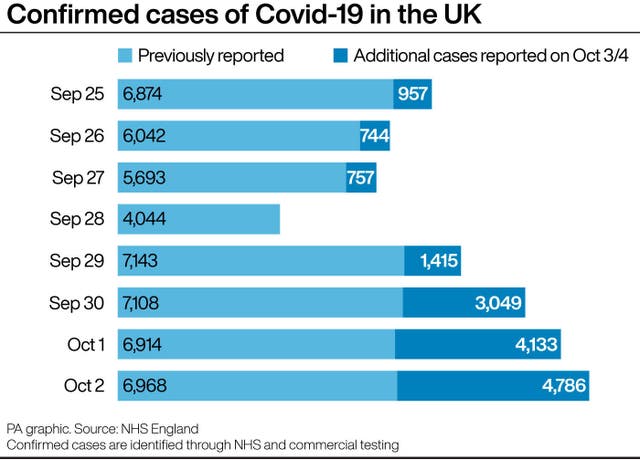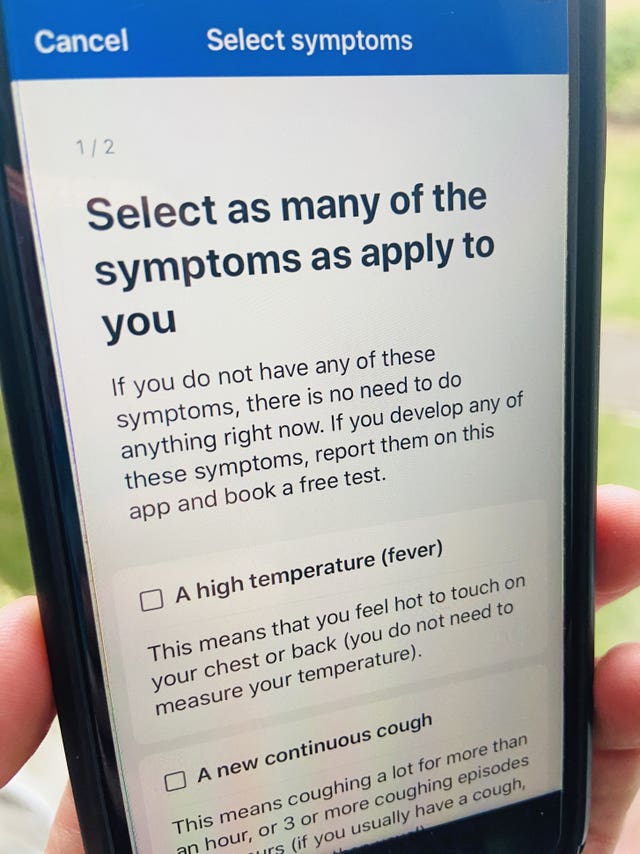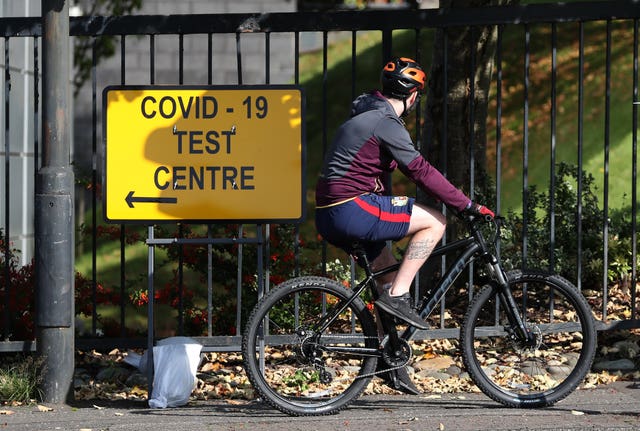How does data blunder affect battle against Covid-19?
The problem has led to a delay in efforts by NHS Test and Trace to find the contacts of those who tested positive for the virus.

An IT blunder has led to delays in efforts to reach thousands of people in contact with people who tested positive for Covid-19.
Here’s what we know so far:
– Why was there such a big leap in cases over the weekend?
According to official data there were 22,961 cases of coronavirus reported on Sunday and 12,872 reported on Saturday.
This compares with around 7,000 cases reported in the four preceding days.
But it has emerged that the big leap in cases occurred due to a “technical issue” which was found on Friday evening.
This glitch meant that 15,841 cases between September 25 and October 2 were left out of the reported daily coronavirus cases.
– Does this mean there has been a surge in coronavirus cases?
Officials said the data published on October 3 and 4 are “artificially high” – because they include cases from as far back as September 25.
But the reported positive cases are still new infections contributing to the rising tide of cases across the UK.
The new figures mean that the number of positive cases between September 25 and October 2 was higher than previously reported.
– Has the problem been sorted?
A note on the Government’s coronavirus data dashboard says that the issue has been “resolved” and PHE has said that “further robust measures have been put in place as a result”.
The issue occurred when people who tested positive were not recorded once a master Excel spreadsheet reached its maximum size.
Officials said that “rapid mitigation” measures have been put in place to ensure the issue does not occur again.

– Did it affect when people got their test results?
No. Officials from PHE and Test and Trace said that people who were tested received their Covid-19 test results in a “normal way”.
– So were contacts of these positive cases reached and told to self-isolate?
As soon as the missing cases were reported, officials said the information was “immediately” handed to NHS Test and Trace so contact tracing could begin and people in contact with those who had the virus were instructed to self-isolate.
But the blunder will have led to an inevitable delay in some contacts being reached.
– Will this have contributed to the spread of the virus?
There is no way of knowing the precise ramifications of the error because of the way the new coronavirus spreads.
Some people are asymptomatic carriers and will be infected without knowing, while others will show symptoms, including a loss or change in sense of smell or taste, a new and persistent cough and a fever; others could be “pre-symptomatic”.

One could presume that all of those who become symptomatic immediately begin to self-isolate at home, but the problem lies with those who are infected but are not aware.
This could lead to them continuing their lives as normal in the community and potentially increasing the spread of the virus.
– Do we know where in the country has been affected by the issue?
Officials have said that the missed data reporting “does not impact the basis on which decisions about local action were taken last week”.
According to data published on Sunday night, the weekly rate of new Covid-19 cases has soared in dozens of areas of England, following the addition of nearly 16,000 cases that had previously been unreported nationwide.
Manchester now has the highest rate in England, with 2,740 cases recorded in the seven days to October 1 – the equivalent of 495.6 cases per 100,000 people, up from 223.2 in the previous week.

Liverpool has the second highest rate, up from 287.1 to 456.4, with 2,273 new cases.
Knowsley is in third place, up from 300.3 to 452.1, with 682 new cases.
Other areas recording sharp increases include Newcastle upon Tyne (up from 256.6 to 399.6, with 1,210 new cases); Nottingham (up from 52.0 to 283.9, with 945 new cases); Leeds (up from 138.8 to 274.5, with 2,177 new cases); and Sheffield (up from 91.8 to 233.1, with 1,363 new cases).
– So how many cases does this mean have been recorded in total?
The number of reported positive Covid-19 cases in the UK has now passed half a million, with the cases reported over the weekend tipping the positive cases over the 500,000 mark – 502,978 cases according to the Government’s coronavirus dashboard.





